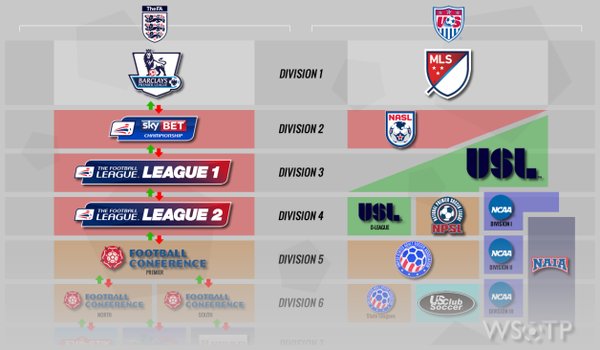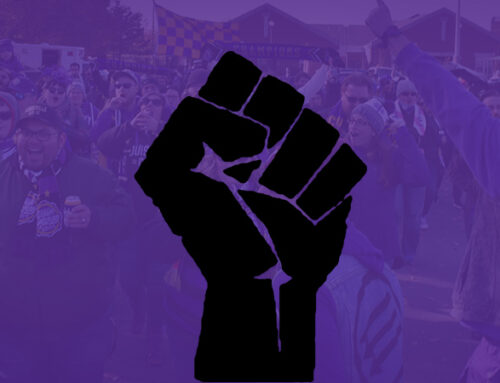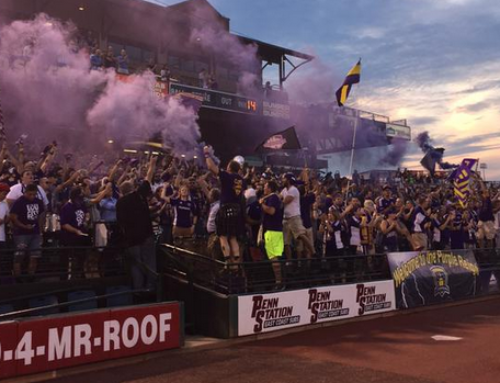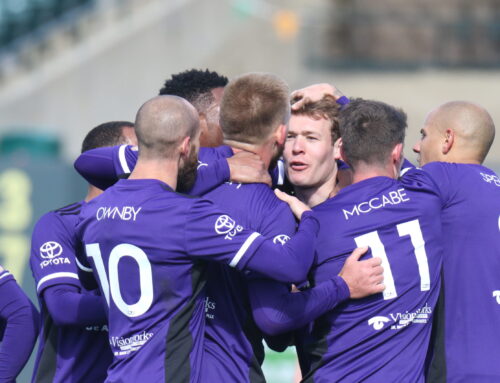Editor’s Note: No one wants to dip their toe into the Pro/Rel internet debate less than your editor, mainly because of the vitriol, social media dings, and hyperbolic dialogue that surrounds the topic. That said, it’s good for clicks on this free website, and nothing else is going on today, SO LET’S DO IT.
As we enter the homestretch of Louisville City’s third and most successful season, it seems an appropriate time to reflect on what the noteworthy achievements of the club mean in the greater context of professional soccer in the United States.
No team at any level of lower division American soccer has achieved such consistent results both on the pitch and in the stands since Louisville City started playing games back in 2015. While this is something that everyone should be massively proud of, allow me to introduce the thesis for this article, which may feel like a bit of rain on our purple parade:
Louisville City is clearly the most successful team in the lower division American soccer that has no path to gaining access to the top tier of the game (MLS).
Throughout all leagues of ‘lower division’ American soccer, only Cincinnati and Sacramento have higher average attendance this season. Sacramento’s “promotion” to MLS has been seen as a sure bet for some time, and Cincinnati’s admittance seems but a formality pending approval for construction of a soccer-specific stadium.
Of the 12 cities that submitted bids for MLS expansion slots earlier this year, 10 of them have lower average attendance numbers than Louisville City. Neither Nashville or San Diego have even fielded fully professional teams at the Second Division level in the modern era, yet their prospects seem bright.
It’s not just in attendance that LCFC outpaces most of it’s peers. The performance on the field has been better than any club in the Second Division over the span of the last 2.5 seasons, with LC gaining more points-per-game and having the best goal difference of any club over that time span.
Attendance in the 94th percentile of all Second Division clubs? Check.
Best record in the Second Division since the club came into existence? Check.
Legitimate plan to build a soccer-specific stadium by 2020, which would be expandable to 20,000 plus should the need arise? Check.
Opportunity to play at the highest level of the sport in the US? N/A.
The reasons why the opportunity to play in MLS is not available to LCFC are many, but I’ll attempt to summarize:
A Geography Lesson
There are four cities within a four hour drive of Louisville who submitted bids this year for MLS expansion slots. Cincinnati is likely in. Nashville’s prospects are looking very strong. St. Louis has long been a favorite of MLS brass, and would be a shoo-in if they could figure a way to get a stadium built. Indy’s prospects have dwindled, but they are still more probable than LouCity’s.
Why does geographic proximity matter? MLS is in the franchise business, and to their reckoning, putting two franchises across the street from each other (except in NY and LA) is bad for business. Their goal is to prevent one market from cannibalizing the customers of another.
Of course, this is nonsense. A look at every other league in the world reveals that geographic proximity is the fuel for the greatest rivalries in the game. Manchester United/Liverpool, Tottenham/Arsenal, Inter/AC Milan, Schalke/Dortmund, etc. Ironically, the LCFC/FCC rivalry is perhaps the clearest distillation of the idea that proximity breeds passion in any level of American soccer.
The Numbers Game
MLS is a cartel run by businessmen, and businessmen are concerned with making money. They do that by dispassionately playing the numbers, and as far as they are concerned, Louisville’s numbers do not look good.
Media market ranking seems to be the number that MLS is obsessed with, which is strange, since their television numbers are abysmal. Louisville ranks 49th in the United States by this metric. The lowest ranked media market currently in MLS is Salt Lake City, who comes in at 34th.
According to the latest rankings, Louisville only has 0.57% of the total media market in the US. Just for fun, I ran the numbers for England, and found the most interesting statistic. There is a city in England that has a mere 0.60% share of the population, and they have a little football club called LCFC, just like us. That’d be Leicester City Football Club. 2016 Premier League Champions.
If the Premier League were run like MLS, there would be no Leicester City.
The 150 Million Dollar Question
I made reference earlier to MLS being a ‘cartel’, which it is, but that is not the complete picture. It’s more like a cartel/Ponzi Scheme hybrid. Unfamiliar with the definition of a “Ponzi Scheme”? From Wikipedia (parenthetical notes are my own):
“A Ponzi scheme (MLS) is a fraudulent investment operation where the operator (Don Garber) generates returns for older investors (Robert Kraft, Stan Kroenke, etc..) through revenue paid by new investors (FC Cincinnati, Nashville SC), rather than from legitimate business activities or profit (MLS claims/admits it is not profitable). Operators of Ponzi schemes can be either individuals or corporations, and grab the attention of new investors by offering short-term returns that are either abnormally high or unusually consistent.
Companies that engage in Ponzi schemes focus all of their energy into attracting new clients to make investments ($150 million expansion fees, new stadiums). Ponzi schemes rely on a constant flow of new investments to continue to provide returns to older investors. When this flow runs out, the scheme falls apart.”
The $150,000,000 “expansion fee” is the answer to why MLS is not coming to Louisville. The LCFC ownership group has money, to be sure, but $150 million is a staggering cost of admission. Could the ownership group come up with $150 million if they had to? Probably. Would it be a wise investment? Probably not.
The Future for Louisville City FC
I feel confident in three things regarding LCFC:
-
Continued success in the stands, especially once the stadium is built.
-
Continued success on the field, particularly if James O’Connor sticks around.
-
Success will occur as a member of USL, not MLS.
The club has reached a moment in which momentum cannot be slowed. Short of the stadium deal imploding, I don’t see the ascent of this team stopping. Attendance has increased almost 30% since the inaugural season. Most of the increase has come via word-of-mouth. Once the newcomers start to tell other newcomers, you get a snowball effect, and the whole thing reaches a critical mass which cannot be slowed, especially when combined with a team that keeps on winning. And at $15 per ticket, it is quite the opposite of a Ponzi Scheme. If you come to LCFC, you pay for a good time, and you almost always get a return on your investment.
So Where Does Pro/Rel Come In?
When Ricardo Silva offered MLS four billion dollars for a media rights deal that would have been contingent on MLS implementing a system of promotion and relegation, it was a monumental shot across the bow at the closed system cartel. For the first time, a group with money, BIG money, had come out in favor of pro/rel for MLS. Instead of buying his way into the cartel, Silva’s proposal was to smash it entirely. MLS owners, of course, declined.
So while Silva’s offer may have been a bit of high stakes showmanship, it made a point. 88% of soccer fans in the US believe that implementing promotion and relegation to the game would be beneficial to club soccer in the country. While it has been easy for MLS to ignore the average fan’s opinion on pro/rel, the equation changes entirely when other people in the rich guys club get involved. It will now be harder and ever for them avoid facing the music.
Louisville City will become a club synonymous with the pro/rel movement because they have done everything right, yet are condemned to a permanent lower division status, apparently for eternity. If a 3-up/3-down system were in place, LCFC would have been promoted twice already, and appear headed in that direction again this year.
How many years of consistent excellence would it take for someone to stand up and say “Enough already! Let them in!”. MLS owners have noticed Louisville City FC. They saw the almost 14,000 in the stands on August 12, which is on par with the attendance for some of their clubs. They saw LCFC mop the floor with FCC, a team they are about to invite into their private club. They may not let us past their velvet rope, but they surely know we are standing right outside the door making noise.
So What Next?
Silva’s proposal, along with some recent developments in divisional sanctioning, have reignited the debate on pro/rel, and have perhaps opened the door just slightly. What would it take to push that door completely open?
Like most popular movements, the force will have to come from the bottom.
MLS and USSF are essentially the same entity, so don’t expect any movement on that front.
FIFA actually has rules that require leagues to have pro/rel, and a recent lawsuit by two lower division clubs has sought to require its enforcement is intriguing, although unlikely to be successful. Asking FIFA to follow any laws, much less its own, is a fool’s errand. The United States and Australia are the only FIFA sanctioned leagues in the world without promotion and relegation, and FIFA seems fine with that fact.
So that leaves it up to the fans, the 88% who favor pro/rel. I don’t just mean Louisville City fans, or supporters of other lower division teams. I mean all soccer fans in the United States. MLS supporters must get on board with pro/rel and become vocal to the point that their voices can’t be ignored by Garber and the owners.
It will take some courage. Imagine being a fan of DC United, sitting at the bottom of the table in MLS, agitating for your own relegation. But it must happen. Some teams will have to go down so that others can go up. The end result, however will be an immediate explosion of popularity of the game across the entire country, across every division. The top of the mountain will finally be accessible to everyone, and the dream of reaching the summit will sustain the game, as it has in every other soccer-playing nation for generations.
Louisville City fans need to get used to hearing “Louisville City” and “promotion/relegation” in the same sentence, because our club is the exact reason why an open pyramid in the United States is imperative. All popular movements need a figurehead. It just so happens that this one may have to be us.







